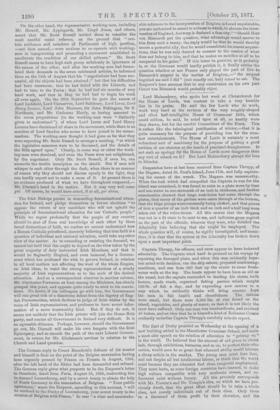The Irish Bishops persist in demanding denominational educa- tion for
Ireland, and pledge themselves in future elections "to oppose the return of any candidate who will not uphold the principle of denominational education for our Catholic people." While we regret profoundly that the people of any country should be shut off from real knowledge of each other by those broad distinctions of faith, we confess we cannot understand how a Roman Catholic priesthood, sincerely believing that true faith is a question of individual and national salvation, could take anyother view of the matter. As to conceding or resisting the demand, we cannot but hold that this ought to depend on the view taken by the great majority of duly instructed Irish Members, and that it would be flagrantly illogical, and even immoral, for a Govern- ment which has professed the wish to govern Ireland, in relation to all local matters not affecting the weal of the whole Empire, on Irish ideas, to resist the strong representations of a steady majority of Irish representatives as to the mode of the desired education. And as a correspondent observes in another column, Mr. Chichester Fortescue at least among the Ministers, has clearly grasped this point, and appears quite ready to stick to his convic- tions. No doubt, if his colleagues go with him, the Government will run great risk of a disastrous defeat from the bigotry of Eng- lish Protestantism, which declines to judge of Irish wishes by the voice of Irish representatives, and professes to have secret infor- mation of a more trustworthy kind. But if they do not, it seems not unlikely that the Irish priests will join the Home-Rule party, and render all Government in Ireland very difficult. It is an agreeable dilemma. Perhaps, however, should the Government go out, Mr. Disraeli will make his own bargain with the Irish Episcopacy, and so smooth the path of the next Liberal Govern- ment, in return for Mr. Gladstone's services in relation to the Church and Land question.


































 Previous page
Previous page